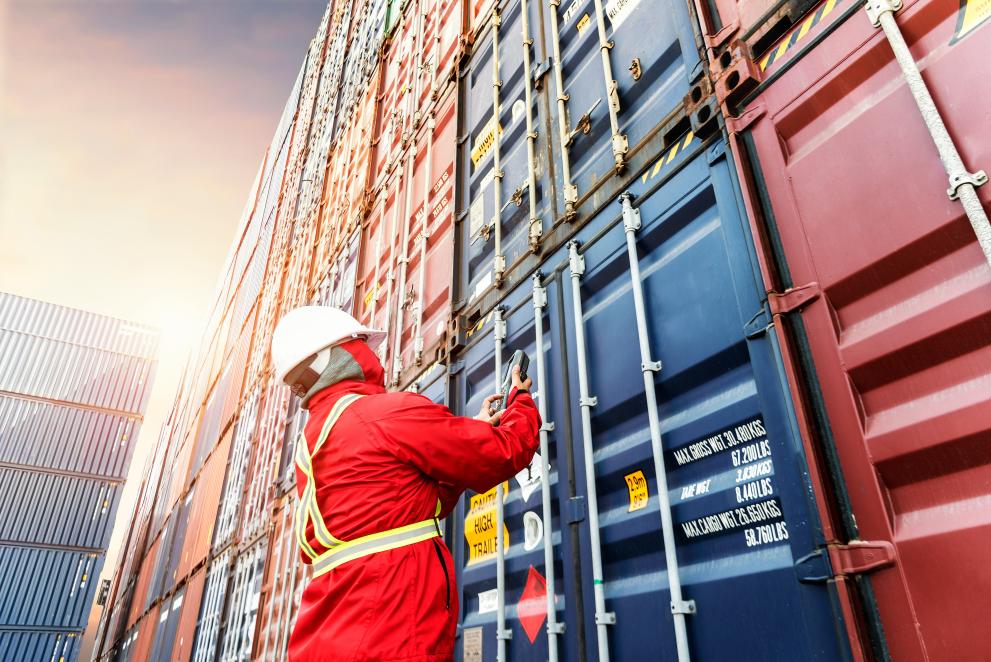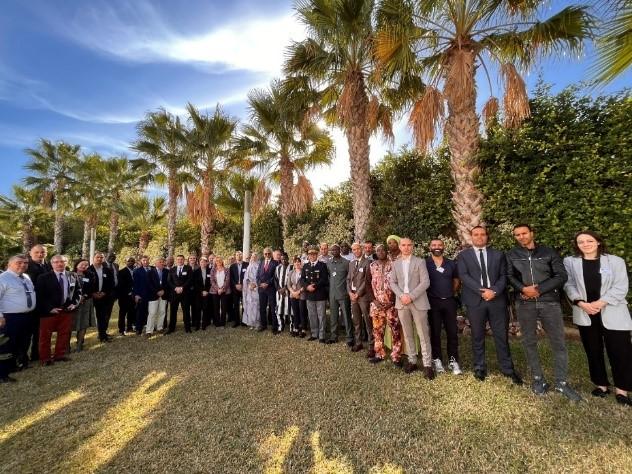
The trade of chemical, biological, radiological, and nuclear (CBRN) substances - including manufacturing, import and export - has become, over the last decades, a global source of concern in the domain of CBRN risk mitigation and the counter-proliferation of weapons of mass destruction (WMD). If falling into the wrong hands, dual use goods, with both civilian and military applications, can pose a threat to international peace and security.
At the crossroads of traditional trade routes of various kinds, the porosity of certain borders and the use of CBRN substances in North Africa and Sahel, some of them with dual use, present a security threat across countries.
Strengthening the institutional and operational framework to control CBRN substances at borders in this region is therefore key to ensure successful non-proliferation and security policies across the African continent.
FRONSEC: seven countries, six years, one goal
As part of its mission to advance CBRN risk mitigation and enhance security and safety worldwide, the European Union has supported the strengthening of cross-border capacity for the control and detection of CBRN substances in the North Africa and Sahel region.
Within the framework of the EU CBRN Centres of Excellence, seven partner countries engaged in the 6-year project FRONSEC to enhance CBRN preparedness and response capacities of the security forces responsible for border control in the area, including controls of goods and people at borders, internal security and civil security.
From 2017 to 2023, Algeria, Burkina Faso, Mali, Mauritania, Morocco, Niger, and Tunisia advanced, with the support of the project implementers*, a series of institutional and operational changes that yielded positive results in the legislative, operational and human domains.
Awareness raising actions, legal framework development, capacity-building activities, provision of equipment, e-learning tools, or field exercises, to name a few, contributed to strengthening the controls and the security of actors at the borders by improving know-how, coordination, collaboration, and communication among relevant personnel involved in CBRN matters.
Inter-agency cooperation: a recipe for success
Since FRONSEC’s inception, all participating countries committed to strengthening inter-agency cooperation as the key effort to counter CBRN risks. Given the multidisciplinary nature of CBRN incidents, risk mitigation policies are effective when multiple actors with different expertise and responsibilities join forces.
An approach open to several government departments, rather than just customs, was unanimously adopted by all partner countries, promoting exchanges between the Ministry of National Defense, Ministry of Trade and Industry, customs, the police, civil protection, and more. It is this inter-agency approach, which made it possible to achieve the collective objectives set by the FRONSEC project.
"The implementation of the project has made it possible to promote exchanges between all the players involved in the control of CBRN substances at borders: customs, police, gendarmerie, civil protection".
Mr. Aissam Mansour, Head of the EU CBRN CoE Regional Secretariat for North Africa and Sahel and National Focal Point for Algeria
Another key success of FRONSEC was the delivery of capacity-building activities to enhance CBRN preparedness and response capabilities by improving substances detection and identification, with equipment provided through the EU CBRN CoE projects 63 and 70.
"The transport of CBRN substances in Burkina Faso is a key issue in the country's CBRN risk mitigation strategy. Thanks to the EU CBRN CoE projects 55, 63 and 70, Burkina Faso now has national expertise in identifying and detecting CBRN substances.
The equipment provided by the European Union is a first step towards strengthening the operational capabilities of each department responsible for CBRN substances control.”
Mr. Boukari BAGGNA, NFP of Burkina Faso
A positive balance sheet: project’s achievements in numbers
- +200 professionales (to date) trained in CBRN risk mitigation via the FRONSEC’s eLearning platform, that will remain active until December 2024 to expand the number of trainees
- +500 professionals received FRONSEC’s Guidebook ‘CBRN substances: threats, detection measures and protection at border crossing points’
- +100 professionals trained on CBRN border control (at airports, ports, and roads) through serious games, an interactive platform dedicated to teach counter CBRN skills and knowledge
- +300 professionals trained on the field, including representatives from border crossing, police, civil protection, military, and health sector
- +1000 professionals reached via awareness-raising initiatives on CBRN risks
- Several units of equipment for CBRN substances identification provided to the partner countries
EU CBRN Risk Mitigation: Building a safer and more secure world
The European Union funded the project FRONSEC within the framework of the European Union Chemical, Biological, Radiological, and Nuclear Risk Mitigation Centres of Excellence (EU CBRN CoE). Supported through the NDICI – Global Europe instrument, the Initiative represents the EU’s largest civilian external security programme.
Funded and implemented by the European Union, with the support of UNICRI, the EU CBRN CoE is working to build a safer and more secure world.
The EU CBRN CoE brings together 64 Partner Countries across 8 regions that cooperate at regional and international level to strengthen CBRN risk mitigation and to promote a global culture of safety and security. Since the Initiative’s inception in 2010, more than 100 EU-funded projects have been implemented to support the mitigation of and preparedness to CBRN risks.
Visit the EU CBRN Risk Mitigation page to learn more about the EU CBRN CoE and other EU flagship initiatives strengthening CBRN safety and security worldwide.
---
*. EU CBRN CoE Project 55 FRONSEC ‘Strengthening cross-border capacity for control and detection of CBRN substances’ was implemented by Expertise France, in partnership with: (1) Secrétariat général de la Défense et de la Sécurité nationale de France (SGDSN), (2) Direction générale des douanes et droits indirects de France (DGDDI), (3) Federal Public Service Finance Belgium (FPS Finance), (4) Détachement central d'intervention technique de France (DCIIT), (5) Université de Liège (ULiège), (6) International Security and Emergency Management Institute (ISEMI), (7) Sustainable Criminal Justice Solutions Group (SCJS).
Details
- Publication date
- 4 April 2024
- Authors
- Service for Foreign Policy Instruments | Joint Research Centre
- CBRN areas
- Bio-safety/bio-security
- Border control and monitoring
- Crisis management
- Denying support for misuse and terrorism
- Illicit trafficking
- Import/export control
- Investigation and prosecution
- Public and infrastructure protection
- Public health impact mitigation
- Safety and security
- CBRN categories
- Chemical
- Biological
- Radiological
- Nuclear
- CoE Region
- NAS - North Africa and Sahel


